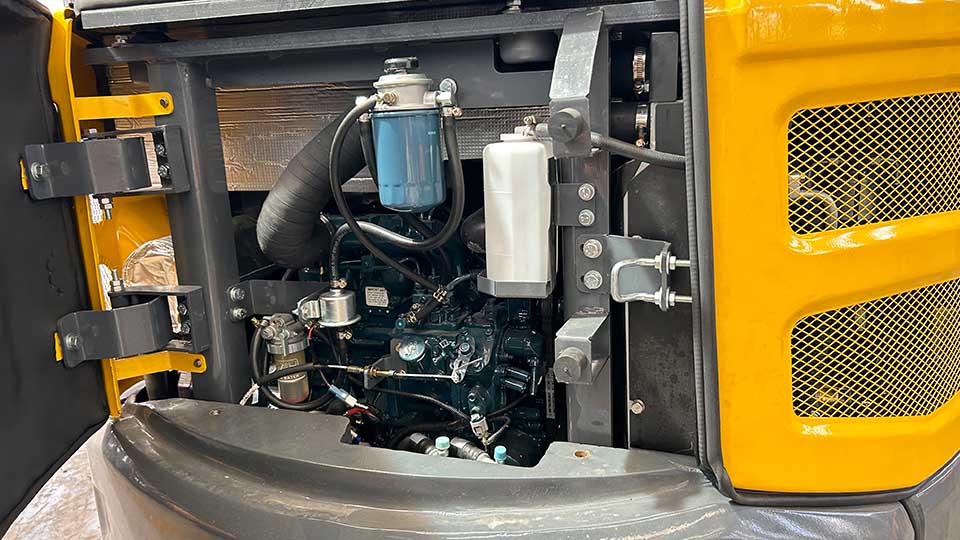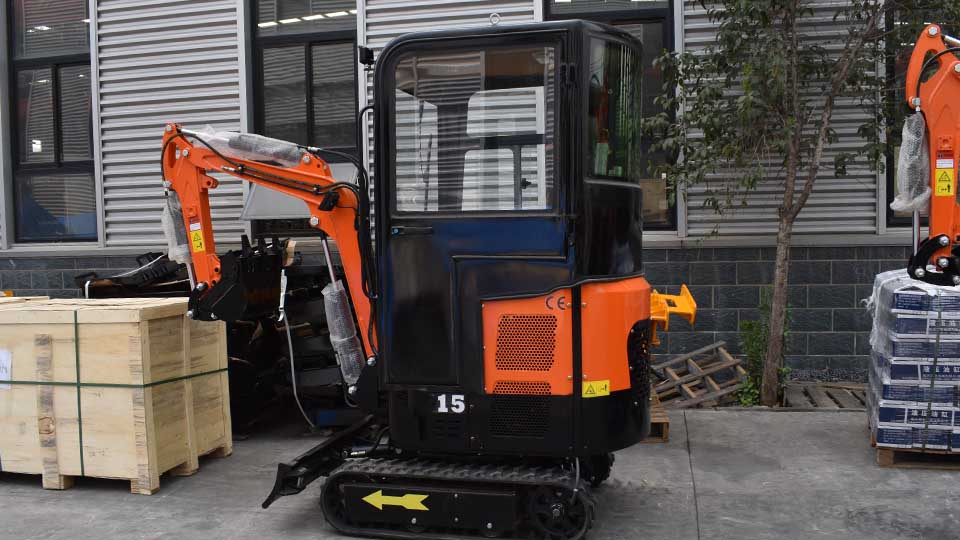The Economics of Long-Term Rentals: Why Discounts Exist
From the perspective of a rental company, a piece of heavy equipment like an excavator is a high-value asset that generates revenue only when it is in use. When an excavator sits in the yard, it is a liability, accruing storage costs, depreciation, and requiring maintenance without generating income.
Long-term rentals, typically defined as rentals lasting a month or more, are highly desirable for rental companies because they guarantee a consistent revenue stream and maximize the equipment's "utilization rate." A high utilization rate is the primary metric of a rental company's profitability. To incentivize longer rental periods, companies adopt a tiered pricing model:

Daily Rate: The highest per-day cost, often used for short, one-off jobs.
Weekly Rate: A discounted per-day rate, typically for a 7-day period. The total cost is often a multiple of the daily rate, but with a built-in discount.
Monthly Rate: The most significantly discounted per-day rate, offered for a 28-day period or longer.
The discount for a monthly rental can be substantial, with the daily rate often dropping by as much as 40% compared to the standard daily rate. This is a win-win: the customer saves money, and the rental company secures a predictable, long-term stream of income.
Phase 1: Pre-Negotiation Research and Preparation
The most effective negotiations are built on a foundation of solid information. Before you ever pick up the phone or send an email, you must do your homework.
1. Define Your Project Scope and Timeline Precisely:
You can't negotiate effectively if you don't know exactly what you need. Create a detailed project plan that answers the following questions:
What size excavator do I need? Don't over-rent. A mini-excavator (under 10,000 lbs.) is perfect for tight spaces and smaller jobs, while a standard excavator (20-40 tons) is necessary for larger earthmoving or demolition projects. Renting a larger machine than required is a waste of money.
What is the minimum required digging depth and reach? This will help you select the right class of machine.
What attachments are necessary? Buckets are standard, but do you need a hydraulic breaker, a grapple, or an auger? Bundling attachments with the excavator can often lead to a discount.
What is the exact duration of the project? Estimate a clear start and end date, but also build in some buffer time. Knowing you need an excavator for "at least 3 months" is a powerful negotiation tool.

2. Benchmark the Market Rate:
Contact at least three to five different rental companies to get quotes for the same make, model, and class of excavator. This is a crucial step that gives you leverage.
National Rental Chains: Companies like United Rentals, Sunbelt Rentals, and The Cat Rental Store have vast fleets and standardized pricing. Their rates can serve as a reliable baseline.
Local & Regional Companies: Smaller, independent rental companies may offer more flexibility and a willingness to negotiate to compete with the national chains. They may also provide better personalized service.
Online Rental Marketplaces: Platforms like DOZR or BigRentz aggregate inventory from multiple suppliers, allowing you to compare prices easily and often find the best deals in one place.
3. Understand the Factors Affecting Pricing:
A quoted price is not just a random number. It is influenced by:
Seasonality: Rental rates are typically highest during the peak construction season (spring and summer) and lower during the off-season (fall and winter). If your project allows for it, planning for the off-season can yield significant savings.
Age and Condition of Equipment: Newer, lower-hour machines with advanced features will command a higher price. If your project doesn't require the latest technology, ask about the availability of older, but well-maintained, equipment.
Supply and Demand: If there is a high demand for a specific class of excavator in your area, prices will be less flexible. Conversely, if a rental company has a particular model that has been sitting idle, they will be more motivated to offer a deal.
Phase 2: Strategic Negotiation Tactics
With your research complete, you are ready to engage with the rental companies. The goal is to present yourself as a valuable, low-risk customer who is ready to commit to a long-term rental.
1. Start with the "Monthly Rate" and Never Back Down to a Daily Rate:
Always express your need in terms of a long-term rental, even if the project may not last for the entire month. For example, instead of saying, "I need an excavator for three weeks," say, "I'm looking for a monthly rental for a project that will last about three to four weeks." This immediately frames the conversation around the most discounted rate.
2. Ask for a "Better Price" or a "Discount":
The number one rule of negotiation is: if you don't ask, you don't get. A simple question like, "Is there any flexibility in that monthly rate?" or "Are there any discounts available for a long-term rental?" is often all it takes to get the conversation started. Many rental companies have a pre-approved discount they can offer to close a deal.
3. Leverage the Competition:
Once you have quotes from multiple vendors, use them as leverage. You can be direct but polite. For example, "I've received a quote from [Competitor] for a similar excavator at [Price]. Can you match or beat that offer?" This forces the rental company to consider their competitive position and the value of your business.
4. Bundle and Add Value:
Instead of just negotiating on the excavator's price, look for ways to add value to the deal. Ask for discounts on attachments, free delivery and pickup, or a "rental rebate" if the equipment is returned early.
Example: "If I rent this excavator for six months, can you include the hydraulic breaker at a discounted rate or waive the delivery fee?"
5. Build a Relationship:
If you are a repeat customer, or if you plan to be one, make that clear. A rental company is more likely to offer a discount to a customer they know and trust. Mention your history of timely payments and proper equipment handling. This positions you as a low-risk, high-value client.
Phase 3: Contractual Details and Cost Management
The best deal isn't just about the lowest quoted price; it's also about a transparent and fair contract. You must be vigilant about the fine print to avoid unexpected costs.
1. Scrutinize the Rental Agreement:
Read every line of the contract before you sign it. Key areas to focus on are:
Overtime Charges: What happens if the machine is used for more than the standard number of hours (e.g., 8 hours/day, 40 hours/week, 160 hours/month)? Many companies charge a hefty overtime fee per hour.
Damage Waiver/Insurance: Most rental companies will offer a damage waiver for an additional fee. While it adds to the cost, it can protect you from liability for accidental damage. Compare this cost to what your company's existing insurance policy may cover.
Fuel and Environmental Fees: Ask about all additional fees. This can include fuel surcharges, environmental surcharges, and other hidden costs. Get a clear breakdown of all charges.
Maintenance and Repairs: Clarify who is responsible for routine maintenance and what happens if the machine breaks down. A reputable company will often cover major repairs and provide a replacement machine to minimize your downtime.
2. Plan for Transport:
Delivery and pickup fees can add hundreds or even thousands of dollars to your total cost, especially for larger excavators.
Ask about transport costs upfront: Get a clear quote for delivery and pickup.
Consider a local rental company: Choosing a rental company close to your job site can significantly reduce or even eliminate transportation fees.
3. Monitor Usage and Invoices:
During the rental period, meticulously track the hours used on the machine and compare them against your invoice. A simple error in billing can cost you. If a machine breaks down, document the downtime and ensure you are not charged for that period.
Conclusion
Finding the best deals on long-term excavator rentals is not a matter of luck; it is a result of a methodical and strategic process. By thoroughly researching your needs, benchmarking market rates, and engaging in confident negotiation, you can secure a price that is not only fair but also maximizes your project's profitability. Remember, every rental company wants to keep its fleet in use, and your long-term commitment is a powerful bargaining chip. By understanding their business model and presenting yourself as a prepared and valuable customer, you can turn a routine rental transaction into a significant cost-saving opportunity.
Post time:Sep-25-2020
